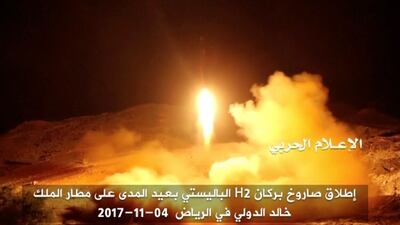Iran manufactured the ballistic missile fired by the Houthi rebels from Yemen towards Saudi Arabia, a US Air Force official in the Middle East said.
Lt Gen Jeffrey L Harrigian, of the Air Forces’ Central Command, said on Friday that the missiles had Iranian markings.
“What we have seen, clearly from the results of the ballistic missile attacks, that there have been Iranian markings on those missiles, that's been demonstrated," he said during a press conference ahead of the Dubai Air Show in the UAE.
"To me that connects the dots to Iran in terms of who's providing those missiles and that capability."
Lt Gen Harrigian's remarks backed Saudi Arabia's statements that Tehran supplied the rebels with the ballistic missile they intercepted over Riyadh on November 4 near the kingdom's international airport. France's president Emmanuel Macron also described the missile as "obviously" Iranian.
"How they got it there is probably something that will continue to be investigated over time," said Lt Gen Harrigian. "What has been demonstrated and shown based on the findings of that missile is that it had Iranian markings on it. That in itself provides evidence of where it came from."
In military briefing papers sent to the Associated Press (AP), Saudi Arabia’s ministry of culture and information said Iran smuggled weapons into Yemen by boat and truck.
"The parts are later assembled under supervision of Iranian military experts, who also help the Houthi militia plan attacks targeting Saudi civilians," the ministry said in a statement to the AP. "Smuggled Iranian Qiam or Zelzal warheads are mounted onto Yemeni-made Burkan ballistic missiles."
A Saudi-led coalition is fighting the Houthis and their allies, forces loyal to former president Ali Abdullah Saleh, to restore the internationally-recognised government of president Abdrabu Mansur Hadi.
Yemen’s vice president Ali Mohsen Saleh said on Friday that Iran and its allies remain a threat to his country.
“The Houthi militias supported by Iran are a real danger to the peace and stability of the region,” he said, according to state-owned Saudi Press Agency. “They are continuously attacking civilians in Yemen and our brothers in the kingdom [of Saudi Arabia].”
___________________
Read more
Britain slams Iran for arming Houthi rebels in Yemen
Saudi Arabia blasts 'Houthi terrorist' actions as UN warns of famine
Saudi crown prince says Iran support to Houthis could be act of war
___________________
In response to the missile attack, the Saudi-led coalition shut down Yemen’s borders on Monday but reopened Aden – which is controlled by pro-Saudi government forces – and Wadea crossings to allow humanitarian aid into the country.
Meanwhile, Yemen’s transport minister Murad Al Halimi said that two airports in the pro-Saudi government-held southern cities of Aden and Seiyun would reopen on Sunday.
He said in a statement late on Friday that national carrier Yemenia would resume its flights to and from the two airports, from where it flies to Amman and Cairo.
The United Nations listed Yemen as the world's number one humanitarian crisis, with 17 million people in need of food, seven million of whom are at risk of famine. At least 10,000 people have been killed in the conflict.
More than 2,000 Yemenis have died in a cholera outbreak now affecting nearly one million people.

